Firm 'being sacrificed on high altar of BRB and BRS principles'
Page 78

If you've noticed an error in this article please click here to report it so we can fix it.
BREACHES of a declaration of intent which the applicant knew to be binding were strongly criticized by counsel for the Transport Holding Company (BRS) and the British Railways Board at the Transport Tribunal last week.
H.B. Transport Ltd., represented by Mr. M. H. Jackson-Lipkin, appealed against a decision of the South Eastern deputy LA who refused a two-vehicle A-licence renewal bid in the terms sought.
Mr. R. Yorke appeared for BRS and Mr. G. Mercer represented British Railways Board.
Mr. Jackson-Lipkin said an application in November 1965 was opposed by British Railways, BRS and two private cbjectors. BR and BRS withdrew their objections during the hearing and the deputy LA granted a licence for a shorter period. The decision was put in writing, though the appellant was not aware of this until a subsequent hearing in 1967.
The case in the lower court was "rather heated" said counsel, but the work done by his Client was no loss to the railways or to BRS. The respondents' attitude was appropriate to that of a state trial of high principle or a TV drama.
A simple matter of a family haulage business wishing to add one named customer for whom one of .the respondents could not carry goods and the other did not had been over-dramatized. His client was being sacrificed on the high altar of the principles of the BRB and BRS.
There had been an apparent refusal at the public inquiry in January but in February a grant was published authorizing: "Fruit and vegetables, tinned foodstuffs, all imported through Sheerness Harbour, all within 200 miles".
The "singular history" was very involved, with two notices of appeal being lodged and correspondence between the LA's office and the Tribunal. H.R. Transport sought to include in its normal user work for Blue Cap Foods (Kent) Ltd. and Citex (London) Ltd., while a large interest in Sheerness harbour development would also require much road transport.
Mr. R. Yorke said the THC welcomed fair competition but insisted that statements of intention made must be honoured. They had been broken within a month of the grant of a licence and the LA should have been informed immediately a significant departure from normal user occurred.
Mr. G. Mercer said the earnings figures for two vehicles were poor. If regularity of work was accepted as a criterion any haulier carrying a bottle of whisky at Christmas would be entitled to include whisky on his normal user. There was no evidence to justify inclusion of Blue Cap in the normal user.
The president, Mr. G. D. Squibb, said the Tribunal's reasons and orders would be reserved but on the merits of the case the deputy LA was right to refuse to grant a licence on the declaration of normal user made to him. If the appellant would make a declaration of fruit and vegetables and canned goods imported into Sheerness for delivery within 200 miles the Tribunal could instruct the LA accordingly. Mr. Jackson-Lipkin said he had to take instructions. It was highly unlikely H.B. Transport would accept this; it would probably go into liquidation.
















































































































































































































































